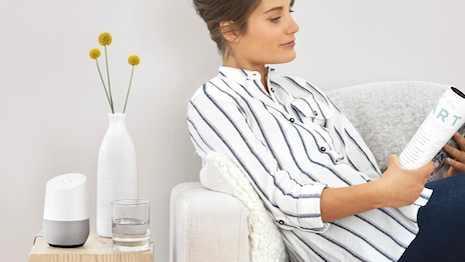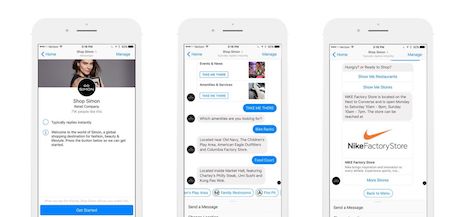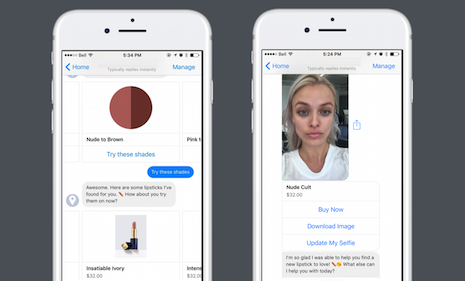Companies are not keeping up with consumers’ growing appetite for artificially intelligent customer service, with a new report from the Capgemini Research Institute finding that less than half of the top firms in retail, banking and automotive offer voice assistants or chatbots.
Seventy percent of consumers can see a future in the next three years in which they will replace visits to a physical store or bank with voice assistant interaction, indicating a growing preference for technology over human service. While AIs are taking over some customer service experiences, companies will need to deploy a combination of human and bot assistant to meet consumers’ needs.
“Conversational interfaces, like iPhone’s Siri or Amazon’s Alexa, are becoming commonplace and mainstream over the last few years," said Mark Taylor, head of customer engagement at Capgemini Invent. "Consumers first used them for simple, easy tasks like setting alarms and turning off lights and this growing comfort level with these conversational interfaces has led to the natural progression of using them to perform tasks like shopping and ordering.”
Capgemini’s report surveyed more than 12,000 consumers who use voice assistants or chatbots, as well as 1,000 executives.
Finding AI’s voice
Voice assistant use is significantly picking up. Adoption among consumers in the U.K., U.S., France and Germany has grown to 55 percent from 51 percent in 2017, and four in 10 of those who say they use voice assistants have only begun leveraging the tools in the last year.
Engaging with a bot verbally appeals to consumers partly because it enables them to be hands-free, with 68 percent saying they enjoy being able to multitask.
Three-quarters of consumers use voice or chat assistants during the purchase path, interacting with the AIs to research products, buy merchandise or check their order status. Fifty-four percent of consumers globally have used a voice assistant to complete a purchase as of 2019, compared to just 35 percent in 2017.
Consumers are also using voice assistants more to engage with brands post purchase, with 53 percent saying they have booked service appointments through this type of AI.
Satisfaction levels with voice assistants are up from two years ago across devices. However, voice assistants on phones got better scores than devices such as the Google Home and Amazon Echo.
 Google Home. Image credit: Google
Google Home. Image credit: Google
Fifty-nine percent of consumers say that personalization via chatbots has also been improving, and 62 percent report satisfaction with companies’ text bots.
Automotive brands are the most apt to employ voice assistants, with 48 percent of the top 100 companies offering verbal assistance.
For instance, Chinese ecommerce giant Alibaba is linking consumers’ cars to their homes with an automotive artificial intelligence solution.
The retailer’s AI + Car solution, which is used by OEMs including Daimler, Audi and Volvo, allows consumers to interact with their vehicles through its Tmall Genie voice assistant, checking the car’s status or controlling settings from their home (see story).
However, automakers are less likely to incorporate chatbots, with only 15 percent having a chatbot feature.
Retail and consumer products brands are largely falling behind in AI customer service adoption, with less than a quarter offering a voice assistant or chatbot.
Three-quarters of companies that have implemented chatbots or voice assistants have seen a positive impact, such as fewer calls to customer service, lower customer service costs and even a bump in loyalty. Consumers are also apt to feel more trust in a company or tell their friends and family about the brand after having a fulfilling experience with an AI assistant.

Simon launched a chatbot to help mall visitors. Image credit: Simon
In addition to helping companies streamline customer service, AIs enable firms to glean information from consumer interactions to power new product ideas.
However, with data sharing come concerns about privacy.
"Privacy and security remain paramount," Mr. Taylor said. "Since our last research, it seems there has been little change in consumer concerns about how voice assistants affect privacy and data security.
"Companies must do more to address both these concerns and consumers' increasing expectations, as conversational commerce increasingly moves into the mainstream," he said.
Human-inspired touch
Companies can improve the experience with AI assistants by making them feel more human and less robotic. This could mean giving consumers the opportunity to personalize their AI customer service representative, something that 58 percent of consumers are interested in.
For example, about half of customers would like to be able to give an AI a custom name or personality. Meanwhile, 60 percent of respondents want their voice assistant to pick up more details over time to personalize their experience.
Consumers are also growing to see voice assistants as an alternative to talking to a human. Forty-two percent feel more comfortable discussing personal issues with a voice bot, and more are turning to these devices for advice such as product suggestions.
Capgemini found that for product research that was low involvement, with minimal questions needed, consumers actually trusted a chatbot more than a human salesperson. However, once a query becomes more complex, they seek out the input of a sales associate over an AI.
"I don't think chatbots are there yet in terms of providing better quality answers in a chat," said Stan Sthanunathan, executive vice president at Unilever, in the report. "They can provide a faster response, but faster is not necessarily always better.
"Therefore, we are using it in conjunction with humans as opposed to in place of humans," he said.
Consumers say they want more context to their chatbot experiences, such as images or videos.
Cosmetics brand Estée Lauder launched a conversational chatbot through Facebook Messenger that let customers virtually try on its products through augmented reality.
The chatbot offered recommendations and answered questions as customers searched for lipstick and other cosmetics. Additionally, technology from ModiFace let customers project an augmented reality version of Estée Lauder products onto her face using a smartphone’s camera (see story).

Estée Lauder's chatbot. Image credit: Estée Lauder
Some brands have created chatbots that reflect their own personality, making a more conversational and human experience for consumers.
When The Cosmopolitan hotel in Las Vegas was looking for ways to leverage digital tools to encourage guests to explore the property, it hit on an idea: creating a virtual guide with sass and personality.
From this decision came Rose, a chatbot with a witty and irreverent personality that has helped drive up engagement and retention among The Cosmopolitan’s customers. At Forrester’s annual Consumer Marketing event in 2018, an executive from the hotel walked attendees through the development of Rose and how the artificially intelligent guide has helped the hotel improve customer experiences (see story).
"“AI-driven customer experience can help companies augment the work of people by freeing up their time to answer the questions that they’re best equipped to answer, helping save money and providing better value for the customer," Capgemini's Mr. Taylor said.
“AI customer service will be immensely beneficial in the luxury space because it offers brands a new way to interact and drive customer intimacy," he said. "For example, Nordstrom’s chatbot, introduced for the holiday season, provided users with personalized gifting suggestions by interacting with them and understanding their preferences.”
{"ct":"xpI3Uuq59EGe5IEBkdTTKSHqdfIdM0k+zDR8nD49uQ2MVqr45eaGtCttXDvHejVLp61xV5HfvHEvM1ksI8AhwMtHEiy1ZsjV0QlTbclY0tpUiyxJ\/JYcgEan\/Mb1svzRwY4ITBDVEZjirrMTkmokYybVngX6aSW05wxFpj08MEeW8qdIbYuWBs79gIv6OSjc\/3vVFfFi4IpDD1QS\/Ml0xH4SH9ohHaxFxf7ZSrUf5c7qS9PQ8XBdO2bNMZOVR7jCxNEAt0OoiB6+JXBXeK+NhIHBwT8b\/O5hcBjsD\/BAMXM4Tw2pnPqdMYsBEVkkEv5jbAZa7uNL3SS0YEOlciXF8IrbCHFsQdp9TE4lPpDSXeStnEWbJYN8xQ2ZobvEMIC4aRTSQTCajleZbIBDAtDE256g1JrPFg+QuV4lyUwRnk41DWLH4FW\/gwVPYypuQuuaM+tsXShLmt8z9oYvbrorM8P+9CioeyLbE64ySVdocolS0MKHk6GU9fQCM8yb5T5Hhmi2G98tmGJkHxTBHeDX7cArZFefO\/7ttpwRAzfBB5Sk73ZJxtd7Lg\/o2bjOmL5GQDe3WZwB3+ujaluDdRZR8jxjaRvu4mIJ1FLwaTvY0Q7Rk7zywRkE1paIwVl9UJG7C3bo2I\/PafSNJOX0DKAbJIzi2IMRzmMdcOFc79oOoIPt0wODJPdOXBsJCEeEcHp\/9LnhTN1\/FodH5Rba8e4AvyGU9ldCtAcJVSKUXzFp2Yvi2OqiqDMtEPIKWaB3ZsybGd5XN3WtlwfVWbmaYiut3SJ+o4DwxN4SCM4rElwFjln4UJPnpacuq2IexrFdSsDF8zxKJSwQwejBmQ5h2WCV5tssQaALfzV1snMJRBCNsCjNSQINkMNZDdUL90Pr4od9vWsiGWhFmCr56z\/12sgLhjBROJztnfxtI4EF0EsXp717j+x3DTe8D5qC8wXi6lBTX8BrWv3lNT8NpRzjWp+Fihy4oUNu7YAYxc4BjsSXknn\/XBqXv27ccbrTFEgaCGOYXEd1z7u41lQWBvEVmorYZ776mvUE2J3zJTD8hEum7Imiui6xiv3v3KDKr4EJwNdhFqlzvAn3lhYOT7qi7V6YwVeGHzJBaKRwme+Gn\/ufzmjHRkDu2uoC0Uel\/8ZBDS42UN\/lmD6BCObvEF1JCTjs3KButReeYK6OIFKnGeY5GWiAFk2SQR1fjyd4vtMNNHjVnX5UKVqrQsehtymgX7eqsLKTrW3GZssTtR2+SaKSpi9ICNkhjXJl+HeCCbZW7g5xVIopCcgNPKgujVQw8NUjMV43iG9r3fCggqMZ21SwVpzu0j6B+YgmmLdQtdytNLxSk3rQkWXwPqwqemCZeVWbqlur\/MNLMpiwZeObvsWUYJRjc2pOeTrm2lfD3MvYj435mbgeayBYExWGpuXrb\/+K3po92+9CKmiQyEr6LYKvImh4thJfj3rlhXE\/UDgOY2xvqagAFfjJN\/iZZRwwpstJjSyIBKA6IWlNkxGNF2ozg+2Kzp3Q8gIib0zzZOu9ruOmkSYqGVIk+QMUSkN0vphUU+K1tS10ZoZbfh2VUCzwOkL9r2ar6rr9jLgEbcQRuMIM4w472KNu\/WbHBk+FTdFT24FHJY7d2Tq5h51cer7LfGQ6Nd7oexaeqNondXOjkIFfadKkpkDiPk+72smZxpgOxWiJ35M8HSkIBNjBCTSH\/GyjIGHfwAKtDc1A8eET3QQXBojWGiSHME9zYW+4+CK4hAjBx5Ww7kTsXN\/QEzwcQLN296eu5uCELxhpI\/0uCk+esFqniYBB5uMtuj1uGYIrWNJIRDxBSc4TwAqu6EAY+lJubcZOhgniW8x6SuA9xqSYqpjA\/eYq5JqnVUHPpRFCYqXiFU6mSmixhpScY5aUqHPi7vnpdG8ktrWX1LfbC\/4wU5OkfnDC1wb9Vt8YuMLqi7qYVb8U9ppP3eqPAcqeN4jkMFB60CKLqv+fqHyu1gjf3HxCoEqQsNmYC3iwO4PpsprMcLMv+0G5IrYUlk5WpCBN1Wdf2b\/xZa+yaqtzeVxPZHMELA7UFfVNMYle81ax7Qj37n4Fq4u9RvZC4hFaAgE3buDjnXzfnaIyN8qcK6O5R2sCxG0uGbLol+yx0wui8iEETXpsSh8zLGUDD8ngmMcUkeQPaZNnaf6Xzq0\/uGI4mEaN9jMJpaNM7Bq0wonjYS23cxkOEisHZOEwzSz50ricQl3bosFVitT1spctt+3eVOvv7IXWLK1RDDyrQjSBwecyeYzGP4y0u3fholVYq0XhzMV1B28SNXbqZhxV2onLoC1izTRAbQd4999NAre1BgdAqkkK08oNOpDjSsaCRnobNSCxO\/vz0+cg5XHZegfcHqWhXMi2OY0QvfxMn3Xem3Ipbwshf1HbYePzLoKiBFGh6OMmyBK7L+7l+\/3REqreY1b97+8vUStcAA7Gev8XgeIt8JGBYdEUTXuJMlrJt2bF50OsIlEHJrbIEngVibYisMr8NPG+dH\/uNG3OOsypqVP\/dGaDmn6AjJSkYYdhLFcSDCUBWBm667hTifoBRP0RTDTn1ypN\/+6iYb+TRbJvT\/\/ZWXUnG1Ldb1Uup4w9RFXprfpDsROKchIOrKlnpMj7PMF3g7s6yhbJmgCnf7BRehBBgOTOohnhZkMenQCl8Q1PDtEm4GOKw3t1E1TWIRZF1Z5PKa0HyLk\/DU+IF2QpJJSyXErskDZ1oXKrhnhLp2WcEG5Ngzr95hgPi7u4TuK3GZCWAwgHulYwPTTm9OChTFJzRtuF3Nc7X2vun1n7isWDAGN7UjIRhW7E\/+Ccbpg\/ehBLB2UWZ1gsusBV6kdDu+xKSdaGPoMKiI2YJmiukKxmgLR9ApeLG9UxUEWnkbiLGky2gmOadKEhItdLK5\/pDvub7\/zgO6BXGNKi5IDlaMAJlSGAif1tuONN3eImPAqNn1jlIpy2EToUqpCiE8sf\/MGnu+wdUG+HRR+4yJGuwENLz92\/gWgV\/bI40QTydL\/iX5IawarvichTI3SQdDnmH6byOryHqxjEvm8kLK8CSZCc0uTPqaCNHI6QZFqbbq9HXGYwovzD0xiR1WuvcMs\/1N6IgyW+w\/e9YgCp6z8X3pam6Dp8mYf+Kab7IzVUeuCNVmAF3QlhkHkao3+CDWLfkVWgckmea3+U6ongtjfhKqOYS5SjTplccMd0HH1Rlr18RFHa10YW6lGwafOvbS+Uf65LS6A6D\/HVuHYt82Pi72mZ0\/+EAcX4uBJGTYvnOQSuKDLiHxs\/5J1VhozUH8huLAlrI9Gb+9GLHIyTlFW9old+LSFwhwwB4v7QAm46gFtFOY1jWs2JIBtGWu\/i7qzs61EyjdtcN4Zvm9ycPOcqAuKn9PaqItAmLNmv+kI5QALYZTQhxCG\/TKU3Rcx321wGnTEsMd1+twXOybqcBFAj5SAHdGadlWw8MhuYWMKFj0uI5pWsF5huLjZ9b\/k7G2S8Rfyr7pniUc1rC\/FJ1XDKE6YT+mQoyOH7ycSDyif9rXZN1PBl8fWcPCw0y3w3B9JG+byIHIKdc+m8gpRvB7fesj2OFAR9PmyRN7ebd+hIa3dKpWf5Rt0S6WPUKSllklEF7vQ1crUOSzDBBcOl2vRth5f3QENWjhfgEGhbvhbO\/xaJbjpuo\/JKRT8HDffYaiXTNIc2vM3sV++DbmsBMIy6o8Ynrs0TtdR1mtzkpQh7h10yN9hR34ZSyT9CSrmk0g6qFyAp7rR8talNvQ78OegOnI9XMZtYKgvLlmgbveFD9mpWtm4bKRB7h9rgkOUgTqJfQwqT0GJne1xWCnXuyj5mbsvCstZCdq1iP809\/MuwISPi3wPnwH1ARysUrc7Yt3cozENv2EKHK5Jiutycux2CfoKA449pU02FOZpurceoZQdIbiGZNy7l7DOEKzLcSt2Yd\/Mfd2DR7pGs\/CO1P37LPug\/h8By71zQwkkdly9mdQmGqt4+JCEhVC7db\/z3hQfhqt1DKkXKR3rjczGHB5z+5aqdVDTNW9Qn2bOI1VqOdZ1Y86mkC7RqniGjBjfi\/hYkRIf27cJkURxYxQD8J+0YY8ZTY7Th9AIw9cZFSeC669KSI51edzwyT4sTW0\/WyVKKM\/VdDYLYCoK4tmZ0FYVwtw20ZAMu3Hr6pc8AEZJ2ac5v6q1+NT4g0\/U35mdbeNwiTcw8iSyldL23YHUqHHld2fLw\/wQXU7NU6RqNS8CE89OKlsmTiLn2ZMmeqbM09PBlTu243GhiX\/GJ2+3izLmpWdZU8AhYx62gWc6wpsFAjvFYjXp2YQpymFnGIh3W7\/GIv6ixI3aCGHvauGHCsI2DbfiONNW5fJhngyZd8kay4RZ86pYe82yusIbKrxUqMYatxqOtevk99HqlvlKowav8WhJe2goP65Ep18AvLrBq8\/feaTXiLq\/N2XGlk4sXR2KRC2P+vPciUxi28Y5ma0boedpGvX3utxyz95vSHCUicbW0ePGYnDHK67gZeWI3jGlr4ZF4muArutd6cNcb9PB0gwcDbs9ADj9xKwFzWf1rOrzhNj2hJjcwh23u3fHQWjKKfaEvqgV2ZDhcGIUb83vEa8VxbcmYlqA9EON8oYrTXBhW6UURmJniMkgF7mxstH\/\/4\/PoZaxMDqes+qbJLJEJNG4urNDqMsl9SxEbyTx\/Ffs4vDxRMpcQsuMRnk6yMoD\/ac380tDGylRlBo1x4x1pWmp8Q6+y1d1X2tvLWMIRTKTOc44ccTcJ7o6Sup8CtBm2+zmemkd+5I+ERWzmmIi9m5JBsgBQaDssy4hCQGWH4SnTmITODagR8Pobc2TCLn2v5zcaqf0zwm89RG93FxqWt\/0F1SOga1rtx4TORwaHF4YB5hFatz8IszPqfofe3hPN9pjYihWuZCfvDn9J468AWti1YpfG4P4LxKhD0F8Emw0ujgBk3tgm03daTAlH09svSoAV+Hw\/b1BFWt5pkFMqutoEM9T2\/c14DSnj+alBEF3pw5zrFluXykVYGkU4GcjPK8Xss1ZBkIoENCnhndKIuTdIx66nqt3fmHAI1Us3uuVUQDOE442PIQnHmepBexeNqwd6v80XhzzTqUrsIDDGy5YIhKWwV7IIoP1+2ZaZna11T8b3\/3aNiHcaK0mwBv9PEI42JdhCVaHIC2AOz5xk0vWgfjEAkPJYSaFrKTkbkFZJi6qpHSXzTc1LY9ZRzj6at2Rsm2Mz1BQqr8lUBTeKuSuPDzDDKFOE+3wIddUuGvjTc7hJ9KlrkuKA1iAt8KZYT98EN1uE3D3aPFveUuXzVQY5pDeIQBG4IC3SvPlmYCfRYsaTeCUJHsGdB+JR1rgnFZi1IxeJfGQ\/0Qozqmw0ikHpDfBDGmf7Lci9NzTYJG8I+3C9u2Q3LeRvVbNzeU4WaW1BUYzqiKxbUMqhVs7p4oX\/aFvwxeemyp3\/vaecdTDpbBy2DR0H6GZCXIkYxky6XEhg5PRpFUzz0J8v2+sXBYG57\/wUjp0RnFy7at6rLJMIn12LZ81YGQOxOCobmtSdmfpLl3g09TfvUqdU1hICxLVFadEeDAGVKVLnjk01gpriLtBX4C701XbzH\/zgLoCRxW6h5DvuMNADwLZrqUehMGNxsMnFqhRPsWrLdsZaQHVAbkG+pJxvz7ypCU6UHyypRna5A6bFd25LG0igZi1fnTz716Ukg0amXBkvAscWyr+f\/qDgSQ1AQt47BpWK6ZNBdoK1hP2x2M7UBPz6dIis5ZoZXGZe9r4U0BtOiAqZKkuKJQ2oB\/dtFcr+aK4tFuw1ciYOEIUOzlX7IFhKo6aQJrV\/yb0O3x94ocibFRjNz3TrPcozD3kIxjNIQakpKnieJTSwWDCIeUGNoAfoA7o6wnJyTw21CtbDlhXyT9UqVw6xNytkNrPeWgD19poF44wo79ySxaul6ubuUzRKSsJHANYBsghqpc3Ukt+\/5XfkYVT+qjNkMeNMuBfsJdnM7OOxcFeliBir0irj\/WItqS3Ct+NOkICRtjuQchhYKeFf\/KoMCcNob15PHa4QbZE2rloFBL69JLCL7dv6l7BvBrhrrQ9rnFZQITikD8Y4fofuj4HJCh2vk1sxpzGYCCwwn5m+waAmjyd1Bxmb1q\/pST0bXJSvndPbOtK78Sey29ptqHablE2YIe1nMCw2BPz46kngF0SPTQ4NQJJ0A80nR4VxZR6X\/Y6QbatVGOl8Gxkj\/TOMeraL8h8nFPvMCwpUIMyOgTfelvWzTBqwW0UCM+JA2Q2OnywNw7E0DGZlnk74cbTd6rjwJtS\/97WruMNADzwsQnsg5ecn1rBH5V0EvV4+9AhWldFg+AHJObUjj63WHgqL2xlIuddl5rh6mRDjabWiKgtLj0P672lm84c7J3LioBPRO\/Bsl6MF4l8tUj9eUiaJ+azb5yqSnYQMnXWU+qH9WjGNynbFc0Gx3hQzRSB1A6ac791eKDx5eN7bN9zRpV7MgDNDBDv5wE2adTXsYboaLScJgutpfTitQfICbSpGovsvjzUc8w+kOAhbxlAqfCUMWNs8LN2O6lhoe9I6o2f6xHjUjyUUxt4RpCiPz012hOWoUH7BLHhgitVL+nP6FwZvAw6uli84kh9++clUi80\/+nFUWCUpoFBlmUd+E28Azd4I99UjLSK9icZXCFzkpVYloAkROIaxSEXhPUiy1LkIw5U4gSrtp8MAmL7XjljMT\/ubU8wc8Xsz+p81v5KGns2DNwRFB39jfT8tfYjEZuV47DLAHU+s85GcD7y2kRNJ\/lF1RMDwtQaaV\/8tz9\/stlxQPgz6hl7SRFfG3I6mFMfSzusmeG1B57aVH1XVnRnaC5HinTT4c9zorp\/5GU+muPlxLC6L6IfDQnIuWmtR9b8n4vDv0OTiG8KlYvrtH1xlT9P2jNu122QDKJcUYV8aEKR\/nKpJFhhGFDgilfTSVvZuf51rPIxBIcwE6fm7ljprd5o9SFo59WPsFhkvVyqEKqBEdGB7lRTLNLxeYxllcHJw989FeWx0Ez2w\/GOfB3pJmAAU+cTJWrSeXqRd1EBwWXhvTWn55R7uDrhQHM58cqYWoES7PyDB2vUxxM3PWGZppiqQ6kil3istwXJ5h5oFvsDgzpAse+V95cDDUObIUjvIw0lUPm1as+8ZzpfGESwP4lbgctA6oAMuMgbA4BA2Yuwn+TK2ddsljxfcdbagGxQ03QE9ob+QwXYP\/YbFsJkAXjyKnObZDPwXEnHk1FuLMMTmze11H8uqRm5Oa5796EPeyMK6EZawytDa4B\/GQUwD9XzJaNwGixQALor2UfMyp8EXmxL9zcHVGEzvd3jH\/dAJQGHR94duS2ifTlXoasMuW87NJ6GBoGEiQ5HJ\/9khUB84sSVti2DJYFgtz7IB7ZPbNAgC\/UkLeYen9wIWHHrrXro3RkbpVg9vxI4Sj6vyhA5J6seg+EMsf5qMtbahPiRKLrce9Au6zi2hK329joX9BX+j20B8X6P2g6+4Czyqc5CjC\/odNIcKWPjFQxE2FaOs7sxDCRI8g0Y1jb5hUX0cHj+H36KPiRB+hdc1bNSdjn5XZKizw4rLOuApMBAu8jnQN6wPYGVAsow7nVwsFEk7Ru92qDCcZ07rI+EaWj93tmWJB9FjOAuXRBGmTiqhOkOmcYRwwZ0q+W6Da+JHkWeLUsIqfg3hmnfh9ZaJTcyoJ2QjdySdBdgmCJmdb+nP3Ceww3Cl0i2tQ3QDpjkpy2jU7VPP24Tbb1RXPxClDv81HEjZcnLGsOnFh9tUbjClveHh5NKovZa\/Co992K7iFQ9I8h52LNW6a3YpVZOWTkhW+0kvCs0fAFWNdYNU9XVP3AgEIui6C1MOfry\/E94X17DChsMPUVtwSpk1niOx\/4kH5y6Sby1RRSQbtxZNALhdpC+49PNA5NJljrd2JplhQQ2y541HwvoHjp7Nf2DyOOgqaeJvOsIkZ9NeLlf3wm8ht9xfcmjp+Bb88cxQOCMvTCz4Q9+RyWQtmx3KrqM6B2q6TtPL6dblFqcAYNZN7rWtpnt5udo7SnNrGhq9bZBYeHQslFtmoh\/2gFnodunI0Lkgp2+WKWhZfxmaatyoHjli6pO8JFco3GdWTejIqGIwk2Cc\/3u3\/9oZMEuYDN5kwZxBTuYMloex4XlnKJr7iMKc3Xp5HCozmG2kBL3J5mrSHd+dd3Z2m2SMCw54IGZliOqitfn\/mkFy8jISUagMu8E6Px94\/hHFAnb1In6dWBv3SF00ittJ+qhZROsrqEkP88tJ9YV1Hthook21nq3xjzl2\/yfyYR7r7jeqciv+M2DPD1vYg8VZiJFHcWcwcrpdlx1gXm56vp9c14iBVXIG3aGC0Bs80wvk1a8HtClyZaFY9B9l+DA0A3t7gx+sycmxiHT\/b7HA90IWSahB4QmwvXf95e3VFuosyrDC1LKqKcNcXWpOrpWZv0l\/lcdtvtlR5ttSu1nycFmKEfdDsCsK30CmjPGfxeTVqJVrCsYk93nVN4p10gnrzv0jlV5Cpwn2pACvSTH1hmzCtOxuCtrWRunMo4wJGeBBcr8Ci7mhmn9q3Tn6YaXXy+wPByrQYDs5FcwVqRhGLTE\/9nXU0x23h1eNqnwBeQYVPWUhNuWvTVodXknB6IGahfynKfz9uebLZuCQ1JoOx0ga8WiOC6jzQxcQHfeMC92KGYmLNWCBQd9QYGccMtUkdYTCl5FVByZgnygIJ148efAacJ1m25d7m+rDXhhlh47VFOb5HzkaA5RMcmw1xE3E1j89RQTEj6o3sIZ4osC3i\/vmnz9p5DNOTKkpgr98ySc0w2DogGmkYWIPon6dnS6Vy10n8f8Vb9L0HUUp5DM+7HxMTeQBwsXcEE4zhtTy+kLK\/eIKFQo1h4K8tK7ehuGjHWz3f3cTJjqKGUfQEO4RJ5PSd7XPuf1ipFCJbSYvzbVmP7SD5ZcByF5QgL2eEQLfTe82Dc2xTPfyoctT+VR6ZHczkKsIyY7rH8II4wkUuwXSKIv4qAfFazpfEd8THAOKy9kjcG9YUeohTp\/kZ0MVouu8UItvguhoJmVnsX3h+t2BmaeardG863E3INk9zmxh5eHlJlLrCDQ0bFHq2E7\/Tti9F5fC4r8SEbJW36z6NbcweahX1tUb5wUgJolHdaxDCXmW1EOWTI0xXNqKCLkylsdmGipfKR6coi3VXKA5zxEeK5XsGJXqdgUFWSXLAMGGz2Qombiv0hM\/Ovbdcp1Ii8rzjMpEzr7bvLYszL\/w1Q1mzF8dWdycgTnfcSRELwWAPvsc90QqX694Z7Lb3EdCGpF4I8H2\/XWIWil39hyY1j90lswH9mSGKP+ukugF8X9ZGmeX7GHIwbmtdeXz34TwUud6htmNlkv6ck7yc2aEu2aWHcKX5ngwnkAteDdrk4QFpOgcbHh9EX5HdsL5gNEQSlu\/KDu+zH3f3fmdR1JZun\/n3Ki8rge0gijMhBr8oQ2k71+NFfwsvWqRXvwAy2uXE87tuzoeOmXEoI5w95pj+mxTSY+3UQYitPa902cFUHMui58CvRZtWnTwylgxC0UQ8Rwbcyf++qX+sOEvYS7QFhgA++tGAg5OeUsQDY4B2ikfJI06yIlM25t7rl54KRS6rrp2ddApzRIbSpYf\/ik\/EZyVdJAH1IFp\/fFdcjCPGK2gp3pRIYM+axL5ZnOHmRjQGfWAUCUukhEfBcSxFTcqdcCjWHz\/qfuyG\/Da2CdQgy\/xKbIWOQrpPIAScqydolSbf\/K2Lnoj6\/qJmG9MS2Q75vFtkyUeDk1ta00kJtidw9LHuUhz1tE2jnaaYsEOAY1kdK5BtKzsEns6PrnJ0LA0srs1laD765vkmQ\/CDh40+OSbLF2O2ffAgqw\/c2Adkj\/qSZhTqmi4RT\/JZW5D2nFAT74qe1KifKyDHQu1bUApVNS5Yh6RYGUKTuwcZXUdLFJrnVTjQq1Xee6a8gAEqNubfyHqx6NWQd3z0ClhmRDwMLXbNo9GP\/jlp4VV1nU0G0ks0w3zNenqvfsUNAfMXreoouiXVXTTBUXt7I+rdA7412IzjSfmypw7xMGllr9jyC6f2rqq2OMC28arYQ2aRnfST51LnV6mrKKI16XtyDsCu5XhTSCt4ldaaoc7dhU1wEKSuk45IqDeXzWh3CTMqQZRwnppBTYX930unrPFHyQeTM\/ZsK4ZVgtzdFOwfPQR4+4RJLNE2ylTXgEGqvkhoaBKww1N2jZOjz+uDc3L3H3CvVlZo46wE\/KhExhMs8Tr3\/1T8ekXPiAdW3t4KyMC3OYuNLFZNIHypqWSdZ\/OkmimSEBlc7EaJA9cyV+drGnRNnoMXpGaRf0BeaIWjGXkC\/vI6cnbnKV0eH4SgvUh8CDYMqWPvL+KlCsv02JtF+goL6cVq80NvTtwmA5c4FtwYhCtHdo3JuSI4Fq\/htgZfsgWHgttFNMTc8z37IQ3XZyfCCOk0BfT6izKKT2hKLeDhT\/GWl7DiXkU7lZ2mCKTjcpcR07e\/d4yP+IP+jld8hWI8qxo6l3hNpAjpFgYETmAjFvr1t+sQ0AXbu3iSksoWbp7LgVr\/5k4JC8iMb41vkW5NCr7NYkhLdNYed7O\/QiAYn5okgcsUmzausxTM0KbRZfcJj5\/Gz\/AfNsh3H2azJmahp\/c1iG6bjarXWKGKiuIkqwde29Ap2TpMOU3a02bk9czGT2Y8aYgDN4sFKHZrLJzYQT+LgSd54IGX0kiYujH4oF6tMxacR1Z4kwy3Z8T\/WVtH8GSgFG+PKbCUZQRXSEqKU5K9yQ54ALKh9JXBf2qChsN+QycmnnPLIfWkrPimHmzd8bu8FtlRZdvSEZjoT9D6fXTLnzrldinI2Z72RUU3Rzwg6d+MH3aZ08z26Bp2dt86Q7Lg0lmW7JoQ4Qd3Go7\/jVDv1lQCEUCJz4uD9HblAaHfvycMWQhZGHlc\/ggTIIRCAaxtrzZ14AgXxNLHt27y7hg2VXyDbC6s4CympcsDA2Rc5SgXxOG9L7oYrjRoo5iqJQ+i\/WR1UuMWg3vwzT2\/UeT3Vm2ptwo5I2Xd6fGRRv++7282v6LwqjsyFQGLQ+hhcX9KnZ+LnL26UbISWrC\/NJubLzk4dnhcBIVUvv+YoThO1oaQdL5xkDjSsyFkhmlune\/+d3F2dNpLHZoopxGLIfluDm3MEW5VaMyOET2LYIjVBq5fNCTaJvalD2F60wr8ovHM09vAO+2z+FJwe5gQfrEGcWIHWvJdxg3NDW1qZSQuFPMT04j7\/N9pPGx4W+jSHhE1IOpSD\/mvK+VTewoQphGgnQ6rVUA3t1fYI0C\/X\/YQkfgGPkYedTHFbQcHrrWcQvcB6jowtcQAmHdBeVLdNc1cKaVra8wWOwhhvLKM\/6LvHY5vUuWx4LEYDiXHGEHcfx5He0ouRIeX4vRaCWRgDL\/K6BvjFqHeKBqWBJxMGwNOyRA8ZPHCnbGq4VbNsWlKafk5rsTh4DN0J4cj9VNVF4ApMiTqM1LFaRmFF9cGmSK+C+LECqGGb4JExXyQ6lzs1nrscx3dpa3jQ8hj4LOo1gPF3plRaWU4bbTaaThTrjkE+82yoPJoJ4MP5lhQaDUWZoxrlVABX5Ez5pqPgLpXFZlBoiS2IxW6bEivKR37ZaBMpXNquUoTHhkaiMSdf0rqWV3nCCWJyh3PuxVEYH+DD+Oegn23u90Ew8eouctiIlem\/zS+cw4GDC7BZ7ukfbqqSgzN+aDLYgBPaDQ43HvXn+8aHdR+RcUMF9+FDmS6yrDg7GYrBLsmNcTsBZHgzUBdzLL0Mf3B5g632ztPrEU+KYsO1Ik\/UcyUsGau5E2RjTeUAMlFvR2eAi14Ps9ps3uteBXHHaNCd5Don3eaLiE6e4Gy+j2Aj98Hi8a5+SKEedvUF9RhHNAz+Gd0L8gn97jPasN4JFqg9qPW5iI52IPtWsT6MXO1zYz6e3cieaaNXSFYPiHZazBvwNkgsO+jgsQDT2CdU\/mMNTomAhj9YXVj3ITijaXppb8KC4h+EWJBWHSfyDa0gyzQzy5rGJqZaMf38dT79w4Zj2WS3acwfqVHF+lLUk3S1LYxHhdnAXHLQc8kVzwFTndIX3dxqg7qHB8q2tLqdYb+ceCkLxipENBtTw8IZ\/11gflhQmjO+g6AHDjKq2B0aznvBgVTIxKsuE3OkBaBDNYrvsiQ95ZdRJ9ekzGewhAhhIaI2clZ64Eunhdiks9SI8yyDZd5OZoqYG\/WDmCkdnH1uHG+xkCTmP3aA\/BCoOmNjv5mPali01kA027kFZ\/mV98R88Or13l5yV1dVHBaPyLprP565zRaOSmXlbh6TpTqVY6OKwqC4rjAQpu451MFNZ6SOV8isfVq+AtHgL2DsfUkmxLtCu\/jsZqb6xBU\/JIHadyH+3IG6n7SyUdQCcvnW+scJG0FySzP\/ayiLOxryaZ9qbC95Uc7acXBHD9PHLm84QtONrA\/yi9X6WgHYYE9al0yOX1mbJtvS\/fF\/4O+83Ti206mXOfz5xE3PJg06BxRJ+pvzvijT9XDl+xovqN9zMhQ8WekAAEFrqmlrVKe6CaaIzByWjJayLRgr6hdatUE3nV0gdQCq3m85pF\/TgYvsH8YX\/q2ySkjqrl\/CZDCcqEm61TyeZN1zsWCo61orB+PcA8Zx9FqdWn10wRMzq\/KQam2S39L+2hHiJwGQN8v3X7lRRkCKybxOlM2NKqUghSM9NbDk\/L5vl7fUT4TaTXtOY7ZyqWpmSw1ISgtNbgq33gAqOl6F\/cGHHJg\/kewZKB6+lCMiX+uk5Xkjpd85EaS3zUcSJCF\/gWSrw5YQKnVakV9aUPPNe4Fv6U0YXYOjuBApAajgumLLqjsIcAhp\/bnoe4Ji0x4+D8h95dC43cggvokYIODyz3J1wgCBTEpZvP5n8Z6alIzwGjFENB4z5I8cZ+yM0C+jbN5BVdsnDghNNhHM1ftAIlwDWi3y5rJ37Hvhxt0pYXFgZrOk4R2Jzid\/IMS4sFTJLcDEet8XDJy8hBx0x6iU+JkzUYtAVzRDjzfYZ2l\/zzU6YZjLj2xRY+1j0R\/oD7nVnonQwIAb0wbrJGCAa7L1RnP+6rPip47lK+zU+PL1eaJC1R5Y3t+FfMkGa9tFd4JPpbszEAMcFd+oegEv8eKAUYYVRupCXB+sxX3wdEQGxWkJKHrx8QMdDu8TSAMBtB3HwvYYJYVF\/9XSXqXxSEzMdnrLZgSJ0vL+IVyzaIo58SMI7lHocx752VaGaydGnRMkt+dWN09DwVwG01j2YMlOcrvwO8RmtWs85zJxU\/o1+zuMw9RUrhEgrthFs5k8mQblJ3EWTOE04mnNUqh+8z+N1\/6eB7UBKIa+lce0SkTxJswRACK2V0TI8kZP\/rpZ6ys8KtOrRB5udJRjGDOvssg4wAz5spW2ZryF47vKD6dqOpMwvNOSuG4iLUlR8P65W4u1OawJcpTeT3Pj8FULQXoZgRO0\/0Pt\/WUifZjyIaU2Oaexoky+Y63YbPwwc38SJbEwSS8gBQZ7I1dwZGLbZ63RHL7oVU1ILBqP4BHdMlvpBsoONx8dObKnXQXPaNcUiQVOwOB2hdOLsmsF7pvkQ+uosllE8Bhuh00BYfoPGAV6v8ld5GIJ8HG8+++0SBofTaAtbkt0rR4xQ=","iv":"baf851bb6e868e207bea7515b7f204bc","s":"17f4279ad3119fdf"}

 Alexa's Echo Show 5 is designed to be put in more rooms. Image credit: Amazon
Alexa's Echo Show 5 is designed to be put in more rooms. Image credit: Amazon
 Google Home. Image credit: Google
Google Home. Image credit: Google